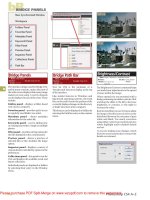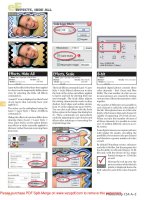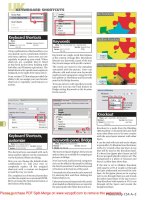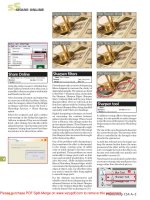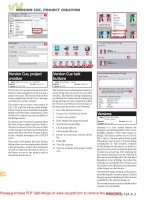The a to z guide to legal phrases
Bạn đang xem bản rút gọn của tài liệu. Xem và tải ngay bản đầy đủ của tài liệu tại đây (190.03 KB, 82 trang )
Plain English Campaign: The A to Z guide to legal phrases
Copyright Plain English Campaign
The A to Z guide to legal phrases
This is only a basic guide. If you have any suggestions, corrections or
improvements, please contact us. You can contact us at:
PO Box 3
New Mills
High Peak
SK22 4QP.
Phone: 01663 744409
Fax: 01663 747038
Email:
Website: www.plainenglish.co.uk
Copyright
Plain English Campaign owns the copyright to this guide. You can save one copy of
the guide to disk, and print one copy out for your personal use. You must not
make more than one copy without our permission.
Introduction
The language used in law is changing. Many lawyers are now adopting a plain
English style. But there are still legal phrases that baffle non-lawyers.
This guide is intended to help in two ways:
•
•
it should help non-lawyers understand legal phrases; and
it should give lawyers ideas for explaining the legal phrases that they use.
The explanations in this guide are not intended to be straight alternatives.
Although we hope the explanations will prompt lawyers to make sure they only
use legal jargon where strictly necessary, our wording is there to explain ideas
and concepts rather than to give strict legal definitions.
The terms and explanations are for the law in England and Wales.
This is very much a 'work in progress', and we welcome any corrections,
clarifications or suggested additions. Please email us with your comments.
The copyright on this guide belongs to Plain English Campaign. Please contact
us if you want to reproduce any part of it.
A
Abandonment
giving up a legal right.
Abatement is:
cancelling a writ or action;
stopping a nuisance;
reducing the payments to creditors in proportion, if
there is not enough money to pay them in full; or
reducing the bequests in a will, in proportion, when
there is not enough money to pay them in full.
Abduction
taking someone away by force.
Ab initio
from the start of something. (This phrase is Latin.)
Abovementioned
describing something which has been referred to
before in the document.
Abscond
when a person fails to present themselves before the
court when required, such as when they have been
released on bail and not returned to court.
Absolute
complete and unconditional.
Absolute discharge
someone who has been convicted of an offence
being released without any penalty. (They may still
have to pay compensation though.)
Absolute owner
the only owner of property such as equipment,
buildings, land or vehicles.
Absolute privilege
a defence which can be used in a case of
defamation if the statement from which the
defamation arose was:
• made in Parliament;
• in fair and accurate news reporting of court
proceedings; or
• made during court proceedings.
Abstract of title
a document, drawn up by the seller, summarising the
title deeds to a property (such as a house).
Abuse of process
when criminal proceedings are brought against a
person without there being any good reason and with
malice.
Abuttals
the parts of the boundaries of a piece of land which
touch pieces of land alongside.
Acceptance
when an offer is accepted unconditionally and a
legally binding agreement is created.
Acceptance of service
when a solicitor accepts a writ on behalf of a client.
Acceptor
the organisation (such as a bank) which will pay the
cheque or bill of exchange it has accepted.
Accessory
someone who encourages or helps another person
to commit a crime.
Accomplice
someone who helps another person to commit a
crime.
Accordingly
a word used in legal documents which means
therefore or so.
Accounts
the record of an organisation's income, spending and
financial situation.
Accumulation
reinvesting income generated by a fund back into the
fund.
Accused
the person charged with a criminal offence.
Acknowledgement
admitting that someone has a claim or admitting that
a debt exists.
Acknowledgement of
Service
when a defendant agrees that a writ or originating
summons ('claim form' since April 1999) has been
received. The defendant fills in, signs and sends
back the acknowledgement of service to confirm in
writing that the documents were received.
Acquit
when a court lets a person go without any penalty. If
a court decides that a person is not guilty of a crime,
or the case has not been proved, it will acquit the
person.
Acquittal
the court's decision that a person is innocent of the
crime they were charged with.
Action
using the law to make a claim.
Active trust
a trust where the trustees have other responsibilities
rather than to just let the beneficiaries have the
trust's assets when they ask for them.
Act of bankruptcy
an act which, if carried out by a person with debts,
could have led to bankruptcy proceedings against
that person.
Act of God
an extreme naturally occurring event (such as an
earthquake, avalanche or flood) that could not have
been anticipated.
Actual bodily harm
hurting another person but less severely than would
amount to grievous bodily harm.
Actual loss
an insurance term which means that the insured item
no longer exists.
Actuary
an expert on pension scheme assets and liabilities,
life expectancy and probabilities (the likelihood of
things happening) for insurance purposes. An
actuary works out whether enough money is being
paid into a pension scheme to pay the pensions
when they are due.
Actus reus
an act which is illegal, such as theft. (This term is
Latin.)
Additional voluntary
contribution (AVC)
extra money people in occupational pension
schemes can pay in to increase their pension
benefits.
Ademption
when a gift in a will cannot be made because the
item no longer exists.
Ad hoc
for a particular purpose. For example, a committee
set up to deal with a particular situation is an ad hoc
committee. (This term is Latin.)
Ad idem
- in agreement. (This term is Latin.)
Ad infinitum
endlessly or forever. (This term is Latin.)
Adjourned sine die
when a court case has no date fixed for it to
continue.
Adjournment
postponing a court hearing.
Adjudge/adjudicate
to give an official judgement about something. For
example, if someone cannot pay their debts a court
may adjudge them bankrupt.
Adjudication order
the former name for a court order which made
someone bankrupt. It has now been replaced with
the term bankruptcy order.
Administration order
an order made by a county court when a person or a
company cannot pay their debts. Normally the court
orders that the debts are repaid by instalments and
as long as the debtor keeps to the order the creditors
cannot do anything else to recover their money.
Administrator
Admissibility of
Evidence
someone who has been appointed:to manage the
affairs of a bankrupt business; or to manage the
estate of someone who has died without leaving a
will.
which evidence can be presented in court. Evidence
must be relevant to the case but even some relevant
evidence cannot be presented, such as hearsay or
evidence of little value. The judge decides whether
or not evidence can be used in the case.
Admission
one side in a case agreeing that something the other
side has alleged is true.
Admonition
reprimanding of a defendant by a judge even though
the case against the defendant has been discharged
(dropped).
.
Adoption
the system which people use to become parents,
even though they are not the child's natural parents.
Adoptive child
a child who has been legally adopted.
Adoptive parent
a person who has legally adopted a child.
Ad valorem
in proportion to the value. An ad valorem duty goes
up as the value of the goods, shares and so on that it
is charged on rises. (This term is Latin.)
Adverse possession
intentionally occupying land to prevent the rightful
owner or tenant using it.
Adverse witness
a witness who gives evidence which damages the
case of the side which asked the witness to testify for
them.
Advocate
is:
•
•
Affidavit
the lawyer who speaks in court for a client; or
a Scottish lawyer who is the equivalent of a
barrister in England and Wales.
a written statement which is sworn to be true by the
person signing it. It is sworn before someone
authorised by the court.
Affirm
to:
•
•
•
•
solemnly promise to tell the truth in court;
solemnly promise to tell the truth in an
affidavit;
confirm a decision made by a lower court;
or
allow a contract to continue even though it
could have been cancelled because it was
fundamentally breached.
Affirmation
solemnly promising to tell the truth when giving
evidence. It is an alternative to swearing an oath
when the person giving evidence does not wish to.
Affray
fighting unlawfully. It is a criminal offence.
Aforementioned
describing something referred to previously in the
document.
Aforesaid
describing something which has been said or
referred to before in the document.
Agency
the relationship between a principal and an agent.
Agent
someone appointed to act for a principal.
Age of consent
the age when a girl can consent to have sexual
intercourse. In the UK it is 16.
Aggravated assault
a more serious type of assault such as one leading
to actual bodily harm.
Aggravated burglary
entering premises armed with a weapon, intending to
steal goods.
Aggravated damages
extra damages awarded because the defendant has
caused the victim anguish, loss of self-respect or
shame.
Aggravated vehicle taking
stealing a vehicle, driving it dangerously and as a
result injuring someone or damaging property.
Agricultural holding
a type of tenancy agreement for someone doing
agricultural work. The tenant has special rights
including, when the tenancy finishes, the right to
compensation for improvements to the land. If the
land has deteriorated the tenant must compensate
the landlord.
Aiding and abetting
helping someone to commit a crime.
Airspace
the space in the atmosphere directly above a piece
of land. If you own a piece of land you also own the
airspace above the land.
Alias
a false name.
Alibi
a claim that a person was elsewhere when a crime
was committed. If someone is accused of a crime
their alibi is:
• evidence that the person was somewhere else
when the crime was committed; or
• an attempt to prove that the person was
somewhere else when the crime was
committed.
Alien
someone from a foreign country.
Alienation
transferring the ownership of property from one
person to another.
All and sundry
everybody.
Allegation
an unproved statement declaring that something has
happened.
Alleviate
to lessen or reduce.
Allocation rate
the proportion of money left to be invested after
charges have been taken off when money is paid
into a fund (such as a pension fund). For example, if
the charges were 2%, the allocation rate would be
98%.
Allotment
shares allocated to a buyer. An allotment of shares
in a company gives the owner (of the allotment) an
unconditional right to buy the shares at a fixed price.
All that
words used in a conveyance to introduce the
description of the property which is being conveyed.
Alternate director
a person appointed by a director to take the
director's place.
Alternative verdict
a person being found guilty of a less serious crime
than the one they were charged with. If a more
serious charge has not been proved and the
defendant has been found not guilty, the defendant
may be found guilty of a less serious crime instead.
For example, there may not be enough evidence to
convict someone of a murder but there may still be
enough for a manslaughter conviction. This is known
as an alternative verdict.
two or more companies combining.
Amalgamation
Ambiguity
capability of more than one meaning. When a
statement's meaning is not clear because it is
capable of more than one meaning, it contains an
ambiguity.
Ambulatory will
a will which can be revoked or changed while the
person who made it is still living.
Amnesty
not punishing a person for an offence they have
committed and removing details of the offence from
the court's records is giving the person an amnesty.
Ancient lights
the right not to have the light you receive from a
neighbour's land blocked.
Annual accounts
the summary of an organisation's financial
transactions during the year covered by their
accounts, and a 'snapshot' of the assets and
liabilities at the end of the year.
Annual general
Meeting
Annual return
the yearly meeting of the members of an
organisation which must be held to meet legal
conditions. The annual accounts are presented for
approval at this meeting.
a return which must be sent by companies to the
Registrar of Companies. Each year the officers of a
company have to fill in an annual return with details
of the members, officers, shares issued and other
information about the company. The return is then
sent to Companies House for filing and is available
for inspection by members of the public.
Annuitant
the person who gets paid an annuity.
Annuity
an amount paid out every year to someone. The
money usually comes from an insurance policy. It
can be split up into smaller amounts and be paid out
more frequently, such as monthly. It is usually paid
for the rest of the beneficiary's life.
Annul
to cancel:
• an invalid marriage; or
• a bankruptcy order.
Ante
before. (This is a Latin word.)
Antecedents
details about the past of a defendant or a person
found guilty of a crime. The information about
previous crimes, background and bad behaviour is
given to the court before the sentence is given.
Antenuptial agreement
a legal agreement between two people who are
about to get married. The agreement sets out how
the couple's assets will be divided between them if
they later divorce.
Anton Piller order
an order by the High Court. It gives the applicant
permission to search the defendant's premises for
evidence, inspect it and take it away. It is intended to
prevent evidence being destroyed or hidden which
would be relevant to the case. (Since April 1999, this
has been known as a 'search order'.)
Appeal
asking a court to overturn a lower court's decision. If
the decision of a court is disputed it may be possible
to ask a higher court to consider the case again by
lodging an appeal.
Appellant
the person who is appealing to a court against a
decision of a lower court.
Appellate jurisdiction
the authority a court has to hear an appeal against a
decision made by a lower court.
Appertaining to
Applicant
the person asking a court to do something.
Appointee
the person who gets the benefit of the use of a
power of appointment.
Appointor
the person who uses a power of appointment.
Appurtenances
minor rights in land such as a right to do something
on the land.
Arbitrage
is:
•
•
borrowing money at a low rate of interest to
lend out again at a higher rate; or
buying and selling in different markets to make
profits out of the price differences.
Arbitration
settling a dispute by using a referee. If a dispute
goes to arbitration it is settled by an independent
referee. It avoids having to use the courts to settle
the dispute.
Arbitrator
the independent referee who settles a dispute
without the need to use the courts.
Arraignment
a procedure at the start of a trial when details of the
offences are read out and the defendants are asked
whether they will plead guilty or not guilty.
Arrest
to seize someone, usually because they are
suspected of committing a crime, and take them into
custody.
Arrestable offence
a crime for which a person may be arrested without a
warrant being needed.
Arson
setting fire to something to cause damage to it.
Articles
the clauses in a document. A company's articles set
out its rules. The articles form part of the
memorandum and articles of association.
Articles of association
documents which set out a company's rules.
Assault
when someone threatens another person with
physical harm. Words on their own do not amount to
assault but threatening gestures do, even if the
person threatened is not touched.
Assent
a document used by personal representatives to
transfer property to a beneficiary.
Asset
something owned such as a building, a vehicle or
money in the bank.
Assign
to formally transfer something, such as when
ownership of property is transferred from one person
to another.
Assignment
the formal transfer of the rights to something. An
example would be a bank customer assigning to the
bank the right to receive the benefits from a life
insurance policy to give the bank security for a loan.
Assurance
insurance cover for an event which will definitely
happen, such as death.
Assure
to transfer the ownership of something.
Assured
the person whose life is insured or who is entitled to
receive the benefit from the assurance cover.
Assured shorthold
Tenancy
a type of tenancy agreement under which the
landlord has the right to take the property back at the
end of the tenancy agreement.
Attachment of earnings
a court order that deductions be made from a
person's earnings. The employer pays the money
collected to the court and the court pays the money
to the people it is owed to.
Attest
to sign to witness a signature on a document.
Attorney
a person appointed to act for another person (such
as when someone cannot look after their own
affairs). A formal document called a power of
attorney is used to appoint the attorney.
It is also the name used for a US lawyer.
Attorney General
the chief legal adviser to the Government. He or she
must be a Member of Parliament (or have a seat in
the House of Lords) and must be a barrister.
Audit
an independent examination of an organisation's
records and financial statements (report and
accounts) to make sure that:
• the financial statements show a fair reflection
of the financial position at the accounting date;
• the income and spending is shown accurately;
• the financial statements meet any legal
conditions; and
• the financial statements are drawn up clearly.
Auditor's report
a report and opinion, by an independent person or
firm, on an organisation's financial records.
Authorised share
Capital
Authorised
Investments
Autopsy
the highest amount of share capital that a company
can issue. The amount is set out in the company's
memorandum of association.
investments in which a trustee is permitted to invest
trust money, under an Act of Parliament.
an examination of a dead body to find the cause of
death.
B
Bail
to pay, or promise to pay, an amount of money so
that an accused person is not put in prison before
the trial. If the accused person does not appear at
the trial, the court can keep the money put up for
bail.
Bailee
a person or organisation looking after valuable items
to keep them safe for the owner.
Bail hostel
accommodation found for people charged with
offences and released on bail, but who do not have a
permanent address so that the police know where to
find them.
Bailiff
an officer of the court who carries out the court's
orders, such as taking a debtor's goods and selling
them to get money to pay the debtor's debts. A bailiff
can also personally deliver (serve) documents on
people.
Bailiwick
the area over which a bailiff has jurisdiction.
Bailment
transferring possession of goods from the owner to
someone else. The ownership of the goods is not
transferred. A practical example of bailment is that
someone who hires a television has possession of it,
but the rental company still owns the television.
Bailor
the owner of valuable items which are in the
possession of another person or organisation for
safekeeping.
Balance sheet
a summary of an organisation's financial position. It
lists the values, in the books of account on a
particular date, of all the organisation's assets and
liabilities. The assets and liabilities are grouped in
categories and paint a picture of the organisation's
strengths and weaknesses.
Banker's draft
a cheque drawn by a bank on itself. It is used when
there must be certainty that a cheque will be paid.
Bankrupt
someone who has had a bankruptcy order.
Bankruptcy order
an order that a court may issue against someone if
they cannot pay their debts when they are due to be
paid. This order takes ownership of the debtor's
property away from the debtor and allows much of
the property to be sold. The money raised is divided
between the creditors following strict rules.
Bankruptcy search
a document which says whether or not someone is
bankrupt.
Bar
the collective term for barristers. When a lawyer
becomes a barrister, it is called 'being called to the
bar'.
Bare trust
a trust which holds property on behalf of a person
until they ask for it back.
Bare trustee
someone who holds property on behalf of another
person until asked to return the property.
Bargain and sale
a contract to sell any property or investment in land
that a person owns.
Barrister
a lawyer who can speak in the higher courts, which a
solicitor is not allowed to do.
Barter
a way of paying for things by exchanging goods
instead of using money.
Battery
using physical force on someone either intentionally
or carelessly and without their agreement.
It would not be battery if two boxers took part in a
boxing match, even though they hurt each other
during the match, because they would have agreed
to fight each other.
Bearer
the person who has a document in their possession.
Bench
the name for the judges or magistrates in a court.
Bench warrant
a warrant issued by a court for the arrest of an
accused person who has failed to attend court. It is
also issued when someone has committed contempt
of court and can't be traced.
Beneficial interest
belonging to a person even though someone else is
the legal owner. If something really belongs to
someone, even if that person does not legally own it,
they have a beneficial interest in it. If, for instance,
parents hold an investment on behalf of their child
they are the legal owners, but the child is the
beneficial owner of the investment.
Beneficial owner
the owner of a piece of land (and the buildings on it).
Beneficial owners have the right:
• to the income their land generates; or
• to use the land for their own purposes.
It can also be a person who really owns something
even though it is held in someone else's name.
Beneficiary
someone who benefits from a will, a trust or a life
Bequeath
insurance policy.
to leave something (such as possessions or money)
to someone in your will. You cannot bequeath land
or real property but you can devise them instead.
Bequest
something given in a will, other than land or real
property.
Bigamy
the offence committed by someone who is already
married but still goes through a marriage ceremony
with someone else.
Bill of costs
the invoice the solicitor sends to a client giving
details of any disbursements the solicitor has paid on
behalf of the client, the fee the solicitor is charging
and any expenses.
Bill of exchange
a signed written order, instructing the person it is
addressed to to pay an amount of money to
someone. A cheque is a type of bill of exchange.
Bill of lading
a document recording the goods a ship carries and
the terms the goods are carried under.
Bill of sale
a document which transfers ownership of goods from
one person to another.
Binding effect
the fact that an agreement must be kept to by law.
Binding over
an order by a court in a criminal case. If someone
has misbehaved or broken the peace, magistrates
can bind them over. The magistrates can order them
to pay a bond. This will be forfeited (won't be repaid)
if the binding over terms are broken.
Binding precedent
following the decisions made by higher courts. Lower
courts must follow the precedents set by the
decisions of higher courts and this is called binding
precedent.
Blackmail
demanding payment from a person in return for not
revealing something shameful about them.
Bodily harm
physical injury or pain.
Bona fide
genuine, sincere or in good faith. (This term is Latin.)
Bona vacantia
goods or an estate belonging to nobody. (This term
is Latin.)
Bond
a written promise to repay a debt at an agreed time
and to pay an agreed rate of interest on the debt.
Bonded goods
goods for which a bond has been paid to HM
Customs and Excise as security for the duty owed on
the goods.
Bonded warehouse
a warehouse approved by HM Customs and Excise
for storing goods imported into the UK until the duty
on them has been paid or the goods have been
exported to another country.
Bonus shares
free shares that a company offers to its
shareholders, in proportion to their existing
shareholdings.
Book value
the value of a fixed asset, such as a building or
machine, as recorded in an organisation's books. It is
usually the amount paid for the asset less an amount
for depreciation.
Bought note
a document showing details of a purchase by
someone for a third party. Stockbrokers produce
bought notes for their clients. The bought note shows
details of the investments the broker has bought for
the client, including the price paid and any
commission and duty charged.
Breach of contract
failing to carry out a duty under a contract.
Breach of duty
failing to carry out something which is required by
law, or doing something the law forbids.
Breach of the peace
(or breaking the peace)
when harm is done to someone, or harm is
threatened.
Breach of trust
when a trustee does something which is against the
trust's rules or fails to do something required by the
trust's rules.
Break clause
a clause in a contract which allows it to be ended.
Bridle way
a path or road which is a right of way for people
walking and people leading or riding horses. Cyclists
can use it as well but must give way to pedestrians
and horses.
Brief
a document prepared by a solicitor which contains
the instructions for the barrister to follow when acting
for the solicitor in court.
Building preservation
Notice
a notice that a building is listed. If a building is in
danger of being altered or demolished, but the local
planning authority thinks it should be preserved, the
authority can issue a notice that the building is listed.
Burglary
entering a building without permission with the
intention of stealing or doing damage.
Bye-law or bylaw
a law made by a local authority. It only applies within
the local authority's boundaries.
C
Call
asking people to pay for new shares they have
applied for. A company makes a call when it asks
buyers of its new shares to pay some, or all, of the
share price. When this happens the shares are being
called up.
Called-up capital
all the shares called by a company when it issues
shares. When calls have been made for the whole of
the share price and the shareholders have paid, the
shares become paid-up share capital.
Canon law
the name for the rules used for running a Christian
church.
Capacity
someone's ability to enter into a legal agreement. For
example, a minor would not be able to buy
something on credit.
Capital allowances
allowances that you can sometimes claim when you
buy long-term assets, such as machines, to use in
your business. You claim part of the cost against
your profits before your tax is worked out for the
Capital gain
year.
the profit you make if you sell or dispose of a longterm
asset (such as a building) for more than it cost
you.
Capital gains tax
a tax charged on certain capital gains.
Capital punishment
punishing someone for a crime by killing them.
Capital redemption
Reserve
A company has to have this reserve in its financial
records and in its accounts if any of the shares it has
issued are cancelled. The reserve cannot be paid out
to the members until the company is liquidated and
so it prevents the company's capital being reduced.
Careless driving
driving a car without consideration for other people
using the road.
Care order
an order by a court instructing the local authority to
care for a child.
Cartel
an agreement between businesses to restrict
competition and keep prices high.
Case law
law that is based on the results of previous court
cases.
Case stated
the written statement setting out the facts of a case.
It is produced by a magistrates' court when asking
the High Court for an opinion on the law.
Causation
one thing being done causing something else to
happen.
Cause of action
the reason someone is entitled to sue someone else.
Causing death by
careless and
inconsiderate driving
an offence committed by someone who is unfit to
drive because of drink or drugs, but nevertheless
drives a vehicle and kills another person. The
punishment for careless and inconsiderate driving is
less severe than for dangerous driving.
Causing death by
dangerous driving
Caution
a criminal offence committed by someone whose
driving is dangerous and results in another person
being killed. The courts consider dangerous driving
to be a very serious offence.
is:
•
•
•
a warning given by the police to a suspected
criminal when the suspect is arrested;
a warning given by the police when they
release a suspect without prosecution that, if
there are any more offences committed by the
suspect, the first possible offence may be
taken into account; or
a document sent to the Land Registry by
someone who may have a right over land,
which demands that no dealings in the land are
registered until the person with the right has
been told.
Caveat
a warning. (This is a Latin term.)
Caveat emptor
'buyer beware'. It is used to warn people buying
goods that they may not be able to get compensation
if the goods they buy are faulty. (This is a Latin term.)
Central Criminal Court
the most senior court covering the centre of London.
Certificate of
Incorporation
a certificate stating that a company has been
incorporated (that is, it has a separate existence from
its members). The Registrar of Companies issues
the certificate of incorporation once a company has
been formed.
Certificate of origin
a certificate stating in which country the goods being
imported were made.
Certiorari
an order by the High Court that a case should be
reviewed. If the High Court considers that a case
heard in a lower court is flawed it may order that it be
reviewed by the High Court. (This word is Latin.)
Challenge for cause
when the defence objects to a juror and says why it



